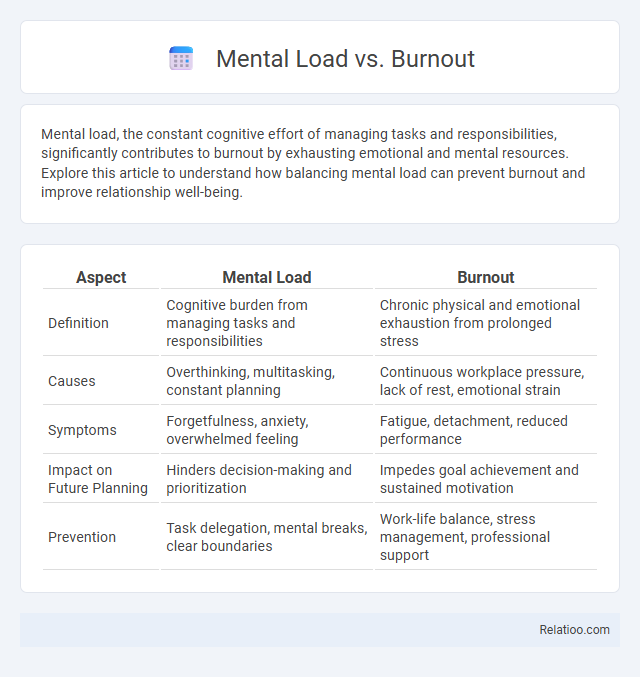Mental load, the constant cognitive effort of managing tasks and responsibilities, significantly contributes to burnout by exhausting emotional and mental resources. Explore this article to understand how balancing mental load can prevent burnout and improve relationship well-being.
Table of Comparison
| Aspect | Mental Load | Burnout |
|---|---|---|
| Definition | Cognitive burden from managing tasks and responsibilities | Chronic physical and emotional exhaustion from prolonged stress |
| Causes | Overthinking, multitasking, constant planning | Continuous workplace pressure, lack of rest, emotional strain |
| Symptoms | Forgetfulness, anxiety, overwhelmed feeling | Fatigue, detachment, reduced performance |
| Impact on Future Planning | Hinders decision-making and prioritization | Impedes goal achievement and sustained motivation |
| Prevention | Task delegation, mental breaks, clear boundaries | Work-life balance, stress management, professional support |
Understanding Mental Load: Definition and Impact
Mental load refers to the cognitive effort involved in managing daily tasks, responsibilities, and planning, often invisible but mentally exhausting. It differs from burnout, which is a state of physical and emotional exhaustion due to prolonged stress, encompassing symptoms like fatigue, cynicism, and reduced performance. Understanding mental load highlights its role as a precursor to burnout and its significant impact on mental health, productivity, and overall well-being.
What is Burnout? Signs and Symptoms
Burnout is a state of chronic physical and emotional exhaustion resulting from prolonged stress or overwork, often linked to excessive mental load. You may experience signs such as persistent fatigue, decreased motivation, irritability, difficulty concentrating, and feelings of helplessness or cynicism. Recognizing these symptoms early can help prevent deeper mental health issues and promote effective stress management.
Key Differences Between Mental Load and Burnout
Mental load refers to the cognitive effort involved in managing tasks, responsibilities, and decision-making, often leading to stress but not necessarily physical exhaustion. Burnout, in contrast, is a state of emotional, physical, and mental exhaustion caused by prolonged stress and overwhelming demands, resulting in decreased motivation and productivity. Key differences lie in mental load being the cause or accumulation of mental effort, while burnout represents the consequence characterized by chronic fatigue and detachment.
Common Causes of Mental Load
Common causes of mental load include the constant juggling of work tasks, household responsibilities, and emotional labor, often without adequate support or recognition. Persistent multitasking and decision fatigue contribute significantly, leading to cognitive overload and stress. This unrelenting pressure can escalate into burnout, characterized by exhaustion, detachment, and decreased productivity.
Triggers and Risk Factors for Burnout
Mental load often stems from managing multiple responsibilities simultaneously, which can trigger chronic stress and overwhelm, leading to burnout characterized by emotional exhaustion, detachment, and decreased performance. Key risk factors for burnout include prolonged exposure to high work demands, lack of control over tasks, insufficient support, and imbalance between effort and reward. Understanding your triggers, such as excessive multitasking or unclear expectations, helps identify early signs and implement effective coping strategies to prevent burnout.
The Overlap: When Mental Load Leads to Burnout
Mental load refers to the constant cognitive effort of managing tasks and responsibilities, which can accumulate over time and overwhelm your capacity to cope. When this persistent mental burden exceeds your emotional and physical resources, it often leads to burnout, characterized by exhaustion, detachment, and decreased performance. Recognizing the overlap between mental load and burnout is crucial for implementing strategies to reduce stress and maintain mental well-being.
Recognizing Early Warning Signs
Recognizing early warning signs of mental load, burnout, and stress is crucial for maintaining your well-being and preventing long-term health impacts. Symptoms such as persistent fatigue, difficulty concentrating, irritability, and emotional exhaustion indicate rising mental load that can escalate into burnout if unaddressed. Monitoring these signals allows you to implement coping strategies and seek support before the condition worsens.
Strategies to Manage Mental Load
Effective strategies to manage mental load include prioritizing tasks, setting clear boundaries, and delegating responsibilities to reduce overwhelm. Incorporating mindfulness practices and regular breaks helps maintain focus and prevent progression to burnout. By organizing your schedule and seeking support when needed, you can alleviate mental strain and protect your well-being.
Effective Ways to Prevent Burnout
Mental load refers to the ongoing mental effort of managing tasks and responsibilities, while burnout is a state of emotional, physical, and mental exhaustion caused by prolonged stress. To prevent burnout, you should prioritize self-care, set clear boundaries, and delegate tasks to reduce overwhelming mental load. Incorporating regular breaks and mindfulness techniques can also significantly support mental well-being and resilience.
Seeking Help: When and Where to Get Support
Recognizing the differences between mental load, burnout, and emotional exhaustion is essential for seeking the right support. Mental health professionals, such as therapists and counselors, provide effective strategies to manage ongoing cognitive strain before it escalates to burnout. Accessing employee assistance programs, support groups, or online mental health platforms offers timely intervention to restore balance and prevent long-term psychological harm.

Infographic: Mental Load vs Burnout
 relatioo.com
relatioo.com